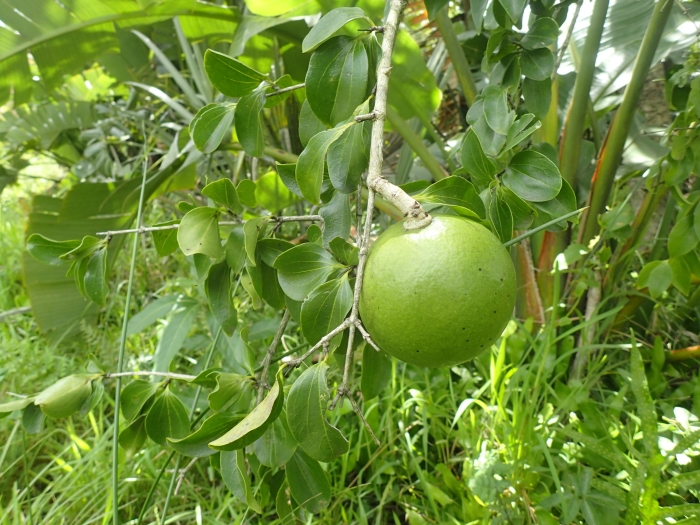Natal Orange
(Strychnos spinosa)
Natal Orange (Strychnos spinosa)
/
/

Mahomed Desai
CC BY 4.0
Image By:
Mahomed Desai
Recorded By:
Copyright:
CC BY 4.0
Copyright Notice:
Photo by: Mahomed Desai | License Type: CC BY 4.0 | License URL: http://creativecommons.org/licenses/by/4.0/ | Rights Holder: Mahomed Desai | Publisher: iNaturalist | Date Created: 2021-03-11T11:52:52-08:00 |
























Estimated Native Range
Summary
Strychnos spinosa, commonly known as Natal orange, is a deciduous tree native to a variety of habitats in tropical and subtropical Africa, including bushveld, riverine fringes, sand forest, and coastal bush. It is found from the Eastern Cape to Kwazulu-Natal, Mozambique, Eswatini, Zimbabwe, Zambia, northern Botswana, northern Namibia, Angola, Guinea Bissau, tropical Africa, northwest Madagascar, southeast Madagascar at Sainte Luce Reserve, southern Kenya, northwest Ethiopia, and western Tigray at Kafta Sheraro National Park. The tree typically reaches a height of 6-8 meters with a spreading crown and stout, thorny branches. The greenish-white flowers, which bloom from September to February, are arranged in dense heads at the ends of branches and are followed by sweet-sour yellow fruits with hard brown seeds that are relished by both humans and wildlife.
The Natal orange is valued for its drought tolerance and ability to thrive in a variety of soil types, although it prefers well-drained soils. It requires full sun to light shade. The tree is often used in rural landscapes for its edible fruit and medicinal properties. The fruits are consumed fresh or used to make beverages and preserves. In traditional medicine, the plant is used by the Tiv people of Nigeria for treating snakebites, venereal diseases, to enhance lactation, and to increase physical strength. However, gardeners should be cautious as all parts of the tree, except for the ripe fruit, contain toxic alkaloids.CC BY-SA 4.0
The Natal orange is valued for its drought tolerance and ability to thrive in a variety of soil types, although it prefers well-drained soils. It requires full sun to light shade. The tree is often used in rural landscapes for its edible fruit and medicinal properties. The fruits are consumed fresh or used to make beverages and preserves. In traditional medicine, the plant is used by the Tiv people of Nigeria for treating snakebites, venereal diseases, to enhance lactation, and to increase physical strength. However, gardeners should be cautious as all parts of the tree, except for the ripe fruit, contain toxic alkaloids.CC BY-SA 4.0
Plant Description
- Plant Type: Tree
- Height: 3.25-30 feet
- Width: 9.75-16 feet
- Growth Rate: Moderate
- Flower Color: Green, White
- Flowering Season: Spring
- Leaf Retention: Evergreen
Growth Requirements
- Sun: Full Sun
- Water: Medium
- Drainage: Medium, Fast
Common Uses
Edible*Disclaimer: Easyscape's listed plant edibility is for informational use. Always verify the safety and proper identification of any plant before consumption., Low Maintenance
Natural Habitat
Native to a variety of habitats in tropical and subtropical Africa including bushveld, riverine fringes, sand forest, and coastal bush
Other Names
Common Names: Spiny Monkey Orange, Natal Orange, Kaffir-Orange, Ara, Bokonga, Bugabuga, Gbakanga, Magboy
Scientific Names: , Strychnos spinosa, Brehmia spinosa, Strychnos buettneri, Strychnos cardiophylla, Strychnos carvalhoi, Strychnos courteti, Strychnos cuneifolia, Strychnos djalonis, Strychnos dulcis
GBIF Accepted Name: